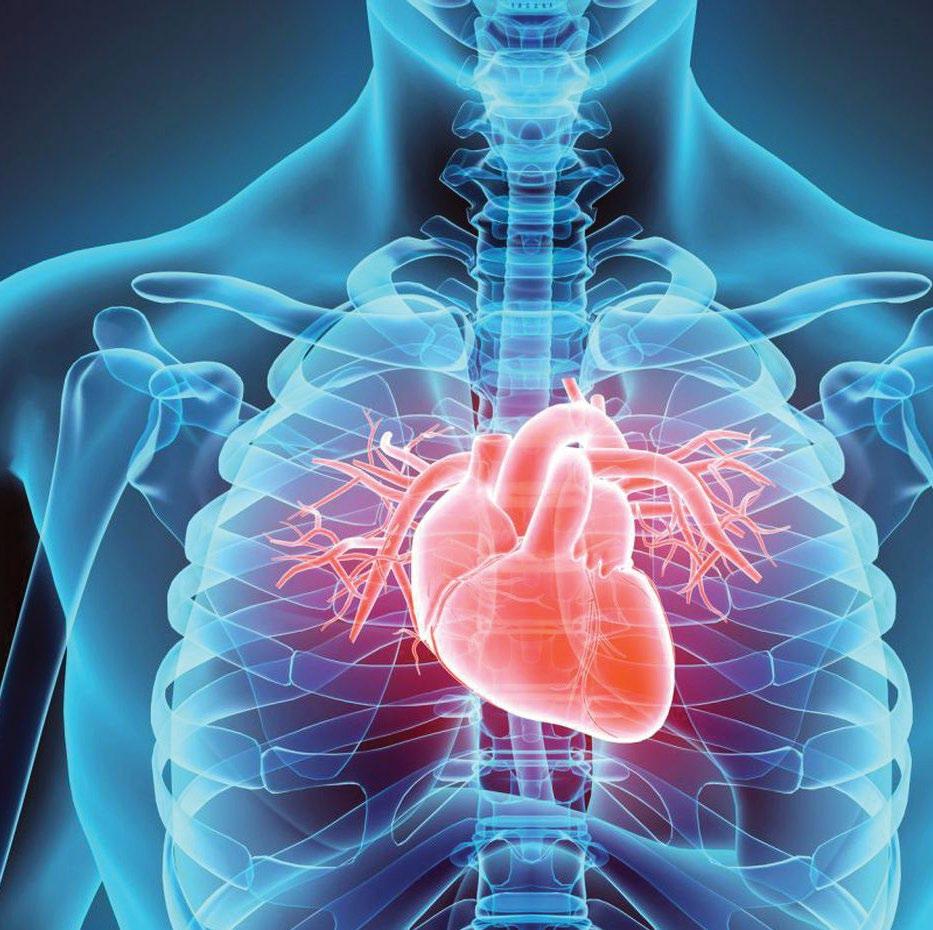
4 minute read
Listen to your Heart
Cardiothoracic and vascular surgery is a superspeciality branch of surgery that deals with the surgery of chest including heart, esophagus, lungs etc as well as the major blood vessels of the body. Cardiac or heart surgery is often considered as the pinnacle surgical branch and needs the surgeon to work with precision and accuracy.
Cardiovascular diseases commonly encountered in Kashmir include heart attacks, rheumatic heart disease, including valvular disease, congenital heart diseases, arrhythmias, coronary artery diseases, myxomatous heart tumour, aortic aneurysm, vascular thrombosis, peripheral vascular disease etc.
Advertisement

Dr. Haroon Naqshi - Department of Cardio Vascular Thoracic Surgery, SKIMS
Signs/symptoms: Symptoms of cardiovascular diseases can vary over a wide range, with some commonly seen symptoms including recurrent or sudden chest pain, pressure, tightness, or a squeezing sensation in chest or arms that may spread to the neck, jaw or back. Similarly, nausea, heartburn or abdominal pain, shortness of breath, very fast or slow heartbeat, or palpitations, sweating, lightheadedness or sudden dizziness, fatigue, swollen limbs, weakness or numb legs or arms, may be the other symptoms related to cardiovascular ailments.
We commonly see people having upper abdominal discomfort, breathlessness or mild chest ache. Sometimes, these could be ominous signs in a patient with underlyind cardiovascular issues.
Misconceptions: Cardiac surgery has come a long way after its advent in the 1950s. The invention of cardiopulmonary bypass machine revolutionized this surgical branch. Major advances have been made in this field and procedures performed have become safer as the time has passed. The myth that a patient who goes under the knife for heart surgery is doomed, is rather ludicrous.
Surgeries for defective heart valves, heart vessel blocks, common congenital disorders, like hole in heart, blue baby syndrome, myxomatous heart tumours etc., are commonly performed nowadays with good results. Complications are reduced further in experienced hands. Patients and their attendants are apprised by the surgeon well before the surgery is taken up, in order to alleviate all the doubts they have about the procedure.
Benefits: Cardiac surgery, though demanding, can be quite rewarding for patients. Most of the symptoms that patients have tend to improve after surgery, while some symptoms completely disappear. The quality of life can improve, with patients returning to near normal lifestyle, if not normal after the procedure.

Patients, once planned for surgery, usually undergo detailed investigations, including baseline blood investigations, as well as heart specific investigations, like ecgs, echocardiography, angiography, cardiac MRI. Once surgery has been completed, patients are kept in Cardiac ICU for 48 to 72 hours for necessary cardiac support and monitoring. Patients are usually mobilised on the second day and subsequently shifted to wards or high dependency areas, where from they are discharged to their homes with necessary medications and advice.
The cost of procedures in the state is usually well below the amount that the patients have to shell out outside the state, where the costs can jump twice, thrice or even more when compared. With various schemes like Ayushman, the burden on the pocket of patient is considerably reduced.
Recent heart attacks in Kashmir: A number of factors can put one at risk for a heart attack. Some factors you can’t change, such as age and family history. Other factors, called modifiable risk factors, are ones which can be altered. Risk factors that you can’t change include age over 65 and if you have a family history of heart disease, high blood pressure, obesity, or diabetes, you’re at a higher risk. Similarly, males are at an increased risk than females.
Modifiable risk factors include smoking, high cholesterol, obesity, sedentary lifestyle and lack of exercise, diet and alcohol consumption, stress, etc.
Kashmir valley has witnessed a rise in the number of deaths caused due to heart attacks while also recording a worrying jump in the incidence of cardiovascular diseases. Heart attacks are usually seen 5th and 6th decades of life, however, now they are increasingly seen in younger population across Kashmir. Majority of these patients are smokers. Drug abuse is another important risk factor seen especially in the younger population. Recent COVID epidemic is again a factor that could well have a role in the increased cardiac events. Winters, with reduced activity levels, always sees a jump in the presentation of these patients. Therefore, it is always advisable to maintain a healthy lifestyle and avoid ill habits like smoking, drugs, alcohol. Besides, incase of any symptoms, one must get a check up done by an expert. Avoiding stress, regular exercise and getting adequate sleep encompasses a healthy lifestyle.










